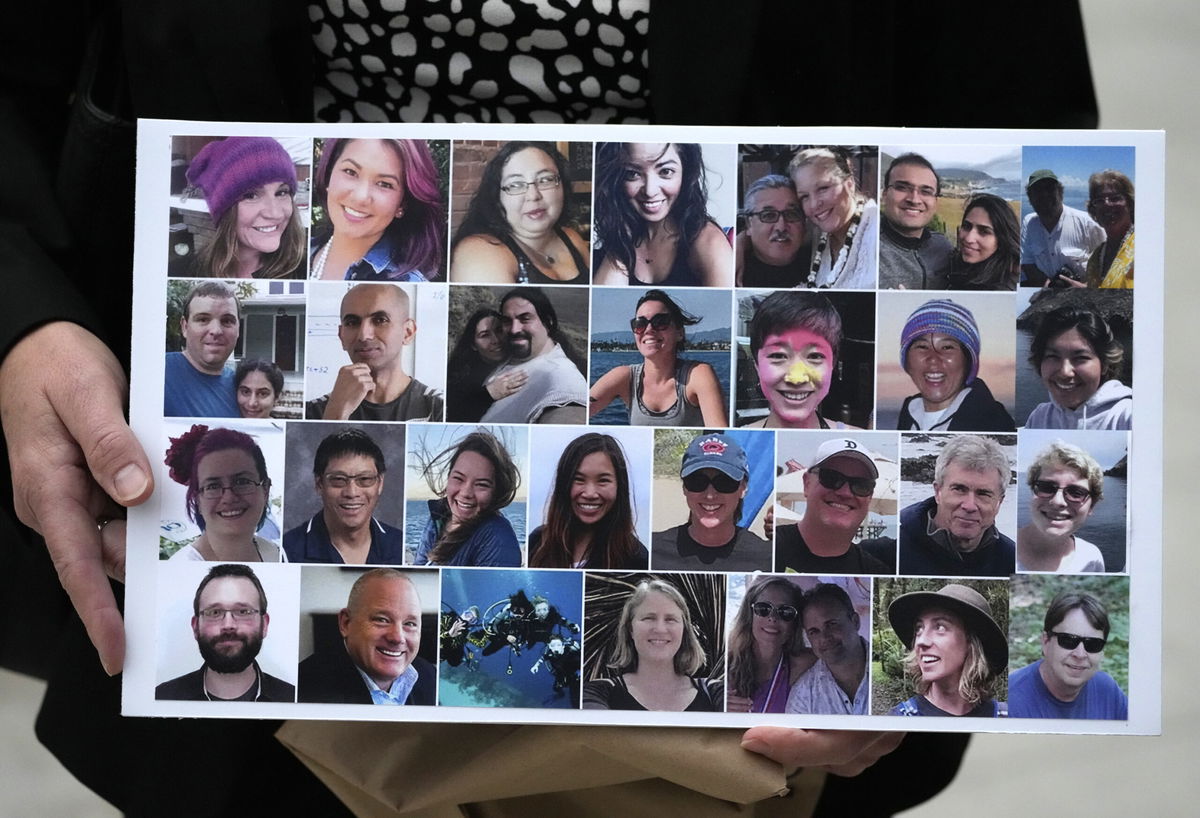Judge hears arguments for restitution to families of 34 people killed in 2019 scuba boat fire

Associated Press
LOS ANGELES (AP) — A federal judge heard arguments Thursday over whether a boat captain should pay restitution to the families of 34 people killed in a California scuba dive boat fire in 2019, with prosecutors seeking reimbursement for funeral expenses and more.
Jerry Boylan, the captain of the Conception, was convicted last year of one count of misconduct or neglect of ship officer following a 10-day trial in federal court in downtown Los Angeles. The charge was a pre-Civil War statute colloquially known as seaman’s manslaughter that was designed to hold steamboat captains and crew responsible for maritime disasters.
Boylan, who was sentenced to four years in prison and three years of supervised release, was also ordered to pay restitution for what was the deadliest maritime disaster in recent U.S. history.
During a hearing Thursday in Los Angeles federal court, however, his attorney attempted to argue that restitution should not be paid because it had not been established that the loss of life was a direct result of Boylan’s actions the night of the fire.
Federal judge George Wu disagreed, saying it was “clearly shown that the defendant did not meet the safety regulation” of having an overnight roving patrol that could have caught the fire, a fact that was already established during Boylan’s criminal trial.
Boylan’s attorney, Gabriela Rivera, also argued that only specific expenses such as funeral costs should be eligible for restitution and should have documentation such as an invoice. She added that Boylan had no significant assets and would not be able to pay restitution, saying he is living off Social Security payments and has a negative cash flow from his bank account.
“He doesn’t have any family,” Rivera said. “He has no meaningful job prospects.”
Prosecutors disagreed, arguing that Boylan in fact had assets totaling six figures and that paying restitution would mean if he ever came into money in the future, he would have to pay the victims.
Kathi Mcllvain, whose son Charles died aboard the Conception, said it was “heartbreaking” to hear the lawyers argue over line-item costs. She and her husband Clark held each other during the hearing and shook their heads as the attorneys went back and forth.
“To nitpick over $700,” said Mcllvain, referring to one amount the defense disputed in their argument. “There’s no price you can put on someone’s life.”
Even if Boylan could not pay restitution now, “at least it should be on the record that he owes that, if he ever does come into money. He shouldn’t have killed 34 people. Then he would have been able to make a living,” Mcllvain said.
McIlvain found it distressing that Boylan was only sentenced to four years and would likely not serve it until his appeal, which could take years.
“Our son’s life was worth a lot more than that,” she said.
The judge said he will have a final decision on restitution amounts at the next hearing July 29.
Boylan is currently out on bond and must report to the Bureau of Prisons by Aug. 8. He was present at Thursday’s hearing but did not speak.
Thursday’s proceeding came nearly five years after the Sept. 2, 2019, tragedy off the central California coast, which prompted changes to maritime regulations, congressional reform and several ongoing civil lawsuits.
The Conception was anchored off Santa Cruz Island, 25 miles (40 kilometers) south of Santa Barbara, when it caught fire before dawn on the final day of a three-day excursion, sinking less than 100 feet (30 meters) from shore.
Thirty-three passengers and a crew member perished, trapped in a bunkroom below deck. Among the dead were the deckhand, who had landed her dream job; an environmental scientist who did research in Antarctica; a globe-trotting couple; a Singaporean data scientist; and a family of three sisters, their father and his wife.
Boylan was the first to abandon ship and jump overboard. Four crew members who joined him also survived.
Although the exact cause of the blaze remains undetermined, prosecutors blamed Boylan for failing to post the required roving night watch and never properly trained his crew in firefighting. The lack of the roving watch meant the fire was able to spread undetected across the 75-foot (23-meter) boat.
But Boylan’s federal public defenders sought to pin blame on boat owner Glen Fritzler, who with his wife owns Truth Aquatics Inc., which operated the Conception and two other scuba dive boats, often around the Channel Islands.
They argued that Fritzler was responsible for failing to train the crew in firefighting and other safety measures, as well as creating a lax seafaring culture they called “the Fritzler way,” in which no captain who worked for him posted a roving watch.
The Fritzlers have not spoken publicly about the tragedy since an interview with a local TV station a few days after the fire. Their attorneys have never responded to requests for comment from The Associated Press, including on Thursday.
Three days after the fire, Truth Aquatics filed suit under a pre-Civil War provision of maritime law that allows it to limit its liability to the value of the remains of the boat, which was a total loss. The time-tested legal maneuver has been successfully employed by the owners of the Titanic and other vessels and requires the Fritzlers to show they were not at fault.
That case is pending, as well as others filed by victims’ families against the Coast Guard for what they allege was lax enforcement of the roving watch requirement.
